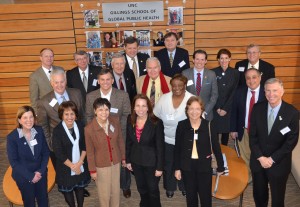Related Posts
A university should be a crossroads of ideas
At her installation, Chancellor Carol Folt said she believes that Carolina can lead as a model for the great public university in America. “We can show how you do it,” she said, “—to be the one that preserves excellence and innovation, access and affordability, a deep commitment to the state, and gathers strength to innovate and meet new challenges.” If UNC is the university to do this, then I believe our School is where it all comes together.
We had a wonderful visit from 16 legislators and various legislative staff members last week. University of North Carolina President Tom Ross and Chancellor Carol Folt welcomed the group, and both stayed for the entire session, an important mark of their commitment. They both spoke knowledgeably about our School and its value to North Carolina. Associate Vice Chancellor Don Hobart gave concrete examples of the value of UNC-Chapel Hill research for North Carolina.
Four really smart, interesting faculty members from the School spoke about their research and its benefits to the state. These four researchers are exemplars. Their research has changed practice and policies and, thus, provided tangible benefits to communities. The implementation of our research is one of the really special dimensions of our School.
Greg Characklis, PhD, professor of environmental sciences and engineering, showed how collaborative water management efforts among communities can achieve dramatic cost savings (millions and millions) and avoid the huge investments for new reservoirs.
Mark Holmes, PhD, associate professor of health policy and management, told the legislators about his and his colleagues’ work to establish the financial solvency of rural hospitals, sharing best practices and helping them get a solid financial footing. Hospital closures can be devastating to rural communities, resulting in as much as a 4 percent decrease in per-capita income. In many of these communities, the hospital is the largest employer. When a hospital closes, many people lose their jobs, access to care and a lot more.
Sandra Martin, PhD, associate dean for research and professor of maternal and child health, shared her experience conducting real-world, real-value research for the U.S. Army. Martin found increases in child abuse when fathers were deployed and mothers were left as the caregivers. As a result of her research, the Army changed a number of policies.
Wayne Rosamond, PhD, professor of epidemiology and adjunct professor of emergency medicine, reviewed the history of the North Carolina Stroke Care Collaborative which he helped to create, along with researchers from Wake Forest, East Carolina and Duke University. When these universities collaborate, they can achieve unheard-of gains for the people of North Carolina. As a result of the Collaborative, North Carolinians who have strokes are more likely to receive premier care. When strokes happen, the speed of getting patients to the right first treatment makes a huge difference in whether and how they live.
Nab Dasgupta, PhD, is a 2013 epidemiology graduate who decided to do something about drug overdose rates in Wilkes County, N.C. In creating Project Lazarus, he not only reduced drug overdoses dramatically in that one county; he started a movement.
These are great examples of our impact, and there are many more as well.
We’re the university for all the people, not only the Republicans, and not only the Democrats
The legislators who visited were both Republicans and Democrats. I’m glad about that. We are not affiliated with a party, and we welcome legislators from both parties to visit and get to know us better. We want the opportunity for dialogue. We want them to learn from us, about us, and we want to hear what they think about important issues. We were so thrilled and excited to have the opportunity for that dialogue. These legislators care intensely about the people in their districts. They’re trying to do their jobs well, just as we are. When people get to know one another, they often find common ground. I hope that the visit helped to lay the foundation for future discussions and more common ground.
Happy Monday. Barbara

